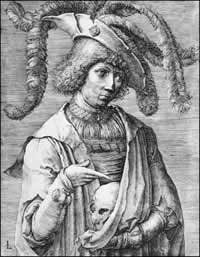
The Intellectual
|
Thus conscience does make cowards of us all, |
| The third and most interesting form is the intellectual;
this is the genuine melancholic humour. With many it was an affectation,
assumed either to advertise the superior mind, or else to cover the empty
head. Its outward signs were a moody silence and a large black hat. "Deep in a dump John Ford alone was got With folded arms and a melancholy hat --" so runs the tag which gives the only piece of interesting information about that gloomy dramatist. - Harrison. p.67 |
 |
The face of melancholy most associated with Hamlet for the last two centuries is that of the intellectual who thinks excessively. This is possibly a distortion of the Elizabethan warning about "considering too closely;" the notion that some things are best left unexamined. Excessive circumspection is generally accompanied by inaction. It is seen as a useful tool for action that becomes a restraint through its excessive use.
| Of the qualities which are first taken from the elements, the melancholick
is, cold and drie: of such as are second, rising from the first, of colour
blacke and swart, of substance inclyning to hardnes, leane and spare of
flesh: which causeth hollowness of eye, and unchearefulnes of countenance,
all these more or lesse, some or all: either as the melancholy is ingenerate,
or gotten by error of diet, hath continued longer, or short time. Of deedes,
and such as are actions of the brayne, either sense and motions, dull,
both in outward senses, and conceited, Of memory reasonable good, if fancies
deface it not: firme in opinion, and hardly removed wher it is resolved:
doubtful before, and long in deliberation: suspicious, painefull in studie,
and circumspect, given to fearfull and terrible dreames: - Timothy Bright, A Treatise of Melancholie, (1586) Facsimile Text Society, New York. 1940. pp. 123-4. |
Our notion of the relationship of melancholy to the intellect is largely shaped by the Romantic revolution of the late 18th Century. It leads us to see excessive brooding as an impairment of clear thinking, and a deterrent for action. Even during the Elizabethan era, however, there were those who considered melancholy to be of benefit to scholars because it engenders a restlessness of the intellect which, in turn, sharpens the wits.
| Wits full of invention, are called by the Tuscanes goatish, for the
likeness which they have with a goate, in their demeanure and proceeding.
These never take pleasure in the plains, but ever delight to walke alone
thorow dangerous and high places, and to approch neere steep down-fals,
for they will not follow any beaten path, nor go in companie. A propertie
like this, is found in the reasonable soule when it posseth a braine well
instrumentalized and tempered, for it never resteth setled in any contemplation,
but fareth forthwith unquiet, seeking to know and understand new matters.
- J. Huarte Navarro, Examen de Ingenios. The Examination of mens Wits. trans. Richard Carew (1594). Da Capo Press, Amsterdam, 1969. p. 67. |
Even John Milton's poetry celebrates the existence of this darkened filter which enables us to contemplate a world that might otherwise be too bright.
| But hail, thou Goddess, sage and holy, Hail, divinest Melancholy! Whose Saintly visage is too bright To hit the Sense of human sight; And therefore to our weaker view, O'er-laid with black, staid Wisdom's hue. - John Milton, "Il Penseroso" |